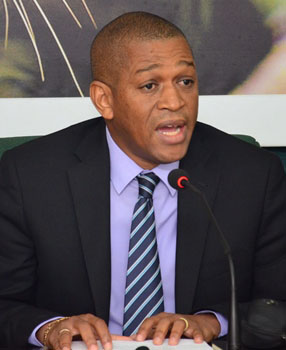The local content policy for the oil and gas sector is still in draft form and the Department of Energy (DoE) is aiming for finalisation by the end of June.
Head of the DoE Dr Mark Bynoe made this announcement on Friday while briefing the media on the developments that the DoE has facilitated since its last press conference early in February.
Before the document is finalised, the draft will go out for consultations with the private sector and other stakeholders, he said.
“I should say, however, that the private sector has asked since we have had multiple consultations before that this process not be lengthy but we seek to condense it so that we can move to finalisation,” Bynoe said, while noting that the DoE has also been working with operators to ensure that there is greater “granularity” in terms of the presentation of their plans.
The APNU+AFC government has been chastised for not acting with greater dispatch on local content legislation.
Nearly four years have passed since the first major oil well was discovered by ExxonMobil and several consultancies later the local content policy is still to be finalised. Critics have said that over this period, local companies and the labour force have lost out on myriad opportunities to overseas companies because of the absence of a local content policy and attendant legislation.
In February, Bynoe had stated that by the end of that month DoE would finalise the legal review and gap analysis that would facilitate the possible drafting of supplementary legislation.
He stated on Friday that the DoE is currently in possession of the analysis and diagnostic review but it has to go through the process of consultation with the other stakeholders since it would not only impact the department but also various government agencies.
“It is because of that review you will see us advertising for legal advisory services because that review is expected to point the way in terms of what needs to be repealed and replaced, what needs to be amended, what needs to be made contextually relevant to the realities we face today. We have been on record indicating that the primary legislation which is the 1986 Exploration and Production Act is silent, for example, with regards to issues on downstream activities,” Bynoe added, while noting that the old legislation also requires enhancement with regards to decommissioning of oil wells and local content.
Bynoe also spoke about work with the country’s technical, vocational, educational and training (TVET) institutions and pointed out that the government continues to offer assistance in a multiplicity of ways by establishing collaboration and a coherent strategy.
“So, firstly, the needs assessment that was completed, which focuses heavily on the TVET institutions and what is required in that sector. Since that time we have been working very closely with the TVET Council and those entities that have been coming trying to set up parallel structures, we have been encouraging them to partner with the TVET institutions,” he said, while pointing out that they are pursuing two pilots to see how they will perform before a holistic strategy is taken. They have also been doing work with the Board of Industrial Training.
Bynoe also noted that the DoE has been working together with the Governor of the Bank of Guyana, the Guyanese insurance community, including the Insurance Association of Guyana and the Environmental Protection Agency to create an environment where all operators, including those in the Stabroek Block, source compliant insurance and demonstrate insurance quantum and terms through third party insurance companies.






